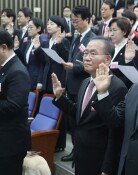Will thawing sanctions against Iran boost construction business?
Will thawing sanctions against Iran boost construction business?
Posted February. 03, 2014 05:39,
GS E&C, a Korean construction company, has recently started to survey the Iranian market to decide on its entry into the market. This proactive attempt is a response to the limited lifting of sanctions against Iran. Expecting that the barrier to the Iranian market will be eliminated, the company is closely watching international situations such as Irans nuclear negotiations while collecting information about Iran from its employees who have worked in Iran. It is internally said that the company is ready to enter the Iranian market with a click of a button.
Before Iran is sanctioned, GS E&C won a deal for the construction of gas desulfurization plant facilities in Iran, which was worth 1.4 billion U.S. dollars, in 2009. An official from GS E&C said, Most of Irans strategic projects of building gas processing facilities in South Pars were granted to Korean construction companies. Iran is an important market for Korean firms, adding, Once a bid process kicks off, remarkable Korean companies, which can meet the requirements for price, technology and construction duration all together, will enter the market.
In fact, Korean construction firms are paying attention to Iran, the fourth largest client in the global construction market. Responding to the lifting of sanctions against Iran, they are taking swift actions, such as strengthening market survey and preparing to enter the market.
On Jan. 20 this year, the U.S. government and the European Commission announced that economic sanctions against Iran will be lifted temporarily for six months. Although the elimination is limited to some areas such as automobiles and petrochemicals, the construction market is likely to be open sooner or later, considering Iranian President Hassan Rouhanis pro-western policies.
In 2009 when Iran was not sanctioned, Korean construction firms won projects worth about 2.49 billion dollars in total in Iran. In terms of the amount, Iran was the fifth largest client to Korean construction firms, following the United Arab Emirates and Saudi Arabia. It even topped the list in 1999, 2002 and 2003. However, after the sanctions, Korean construction firms couldnt conclude even one deal with Iran, and during the absence, Chinese and Indian companies have filled up the vacancy.
According to the International Contractors Association of Korea (ICAK), Irans construction market is estimated to be about 88.7 billion dollars in 2013 and expected to almost double by 2016 (about 154.4 billion dollars). This kind of estimation is based on that Iran has an urgent need to build new plants in order to export its crude oil and that its demands for infrastructure must be large given its land scale.
Korean construction firms are taking actions behind the curtains while watching international political situations. Hyundai E&C and Daelim, two major constructors in Korea, have operated a local office in Tehran where Korean and Iranian employees work together in order to re-enter the Iranian market at some point. An official from a large construction firm said, Since gaining trust from a client is very important in the Middle East, Korean construction firms have maintained relationships (with Iranian clients) even after sanctions. Kwon Myeong-gwang, an ICAK manager in charge of Iran and Kuwait markets, said, Iran is a big market, and projects that couldnt be embarked on due to economic sanctions may come to the market all at once, adding, Construction of oil and gas facilities is promising.
Nevertheless, some point out that the time is not yet ripe for such a high expectation because construction orders cannot be placed yet. An official from another large construction firm said, The Korean government has not yet announced its response regarding Iran, and the recent lifting of sanctions is only temporary, adding, Unless the U.S. definitely eliminates the sanctions, there wont be much room for Korean companies to move.







